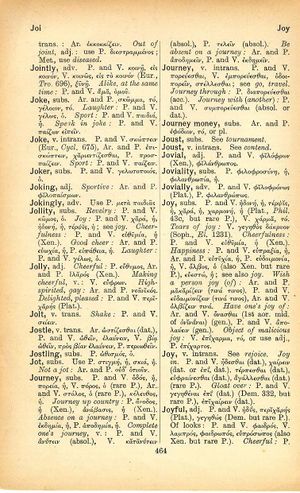joy: Difference between revisions
μὴ κακὸν εὖ ἔρξῃς· σπείρειν ἴσον ἔστ' ἐνὶ πόντῳ → do no good to a bad man; it is like sowing in the sea
(CSV4) |
m (Woodhouse1 replacement) |
||
| Line 1: | Line 1: | ||
{{Woodhouse1 | {{Woodhouse1 | ||
|Text=[[File:woodhouse_464.jpg|thumb|link={{filepath:woodhouse_464.jpg}}]] | |Text=[[File:woodhouse_464.jpg|thumb|link={{filepath:woodhouse_464.jpg}}]] | ||
P. and V. [[ἡδονή]], ἡ, [[τέρψις]], ἡ, [[χαρά]], ἡ, [[χαρμονή]], ἡ ( | ===substantive=== | ||
[[prose|P.]] and [[verse|V.]] [[ἡδονή]], ἡ, [[τέρψις]], ἡ, [[χαρά]], ἡ, [[χαρμονή]], ἡ ([[Plato]], ''[[Philoctetes]]'' 43C, but rare [[prose|P.]]), [[verse|V.]] [[χάρμα]], τό. | |||
[[tears of joy]]: [[verse|V.]] [[γεγηθὸς δάκρυον]] ([[Sophocles|Soph.]], ''[[Electra]]'' 1231). | |||
[[cheerfulness]]: [[prose|P.]] and [[verse|V.]] [[εὐθυμία]], ἡ ([[Xenophon|Xen.]]). | |||
[[happiness]]: [[prose|P.]] and [[verse|V.]] [[εὐπραξία]], ἡ, [[Aristophanes|Ar.]] and [[prose|P.]] [[εὐτυχία]]. ἡ, [[prose|P.]] [[εὐδαιμονία]], ἡ, [[verse|V.]] [[ὄλβος]], ὁ (also [[Xenophon|Xen.]] but rare [[prose|P.]]), [[εὐεστώ]], ἡ; see also [[joy]]. | |||
[[wish a person joy]] ([[of]]): [[Aristophanes|Ar.]] and [[prose|P.]] [[μακαρίζειν]] ([[τινά τινος]]). [[prose|P.]] and [[verse|V.]] [[εὐδαιμονίζειν]] ([[τινά τινος]]), [[Aristophanes|Ar.]] and [[verse|V.]] [[ὀλβίζειν τινά]]. | |||
[[have one's joy of]]: [[Aristophanes|Ar.]] and [[verse|V.]] [[ὄνασθαι]] (1st aor. mid. of [[ὀνινάναι]]) (gen.), [[prose|P.]] and [[verse|V.]] [[ἀπολαύειν]] (gen.). | |||
[[object of malicious joy]]: [[verse|V.]] [[ἐπίχαρμα]], τό, or use adj., [[prose|P.]] [[ἐπίχαρτος]]. | |||
===verb intransitive=== | |||
See [[rejoice]]. | See [[rejoice]]. | ||
[[joy in]]. [[prose|P.]] and [[verse|V.]] [[ἥδεσθαι]] (dat.), [[χαίρω]], [[χαίρειν]] (dat. or [[ἐπί]], dat.). [[τέρπεσθαι]] (dat.), [[εὐφραίνεσθαι]] (dat.), [[ἀγάλλεσθαι]] (dat.) (rare [[prose|P.]]). | |||
[[gloat over]]: [[prose|P.]] and [[verse|V.]] [[γεγηθέναι ἐπί]] (dat.) ([[Demosthenes|Dem.]] 332, but rare [[prose|P.]]), [[ἐπιχαίρειν]] (dat.). | |||
}} | }} | ||
Revision as of 08:50, 20 May 2020
English > Greek (Woodhouse)
substantive
P. and V. ἡδονή, ἡ, τέρψις, ἡ, χαρά, ἡ, χαρμονή, ἡ (Plato, Philoctetes 43C, but rare P.), V. χάρμα, τό.
tears of joy: V. γεγηθὸς δάκρυον (Soph., Electra 1231).
cheerfulness: P. and V. εὐθυμία, ἡ (Xen.).
happiness: P. and V. εὐπραξία, ἡ, Ar. and P. εὐτυχία. ἡ, P. εὐδαιμονία, ἡ, V. ὄλβος, ὁ (also Xen. but rare P.), εὐεστώ, ἡ; see also joy.
wish a person joy (of): Ar. and P. μακαρίζειν (τινά τινος). P. and V. εὐδαιμονίζειν (τινά τινος), Ar. and V. ὀλβίζειν τινά.
have one's joy of: Ar. and V. ὄνασθαι (1st aor. mid. of ὀνινάναι) (gen.), P. and V. ἀπολαύειν (gen.).
object of malicious joy: V. ἐπίχαρμα, τό, or use adj., P. ἐπίχαρτος.
verb intransitive
See rejoice.
joy in. P. and V. ἥδεσθαι (dat.), χαίρω, χαίρειν (dat. or ἐπί, dat.). τέρπεσθαι (dat.), εὐφραίνεσθαι (dat.), ἀγάλλεσθαι (dat.) (rare P.).
gloat over: P. and V. γεγηθέναι ἐπί (dat.) (Dem. 332, but rare P.), ἐπιχαίρειν (dat.).

